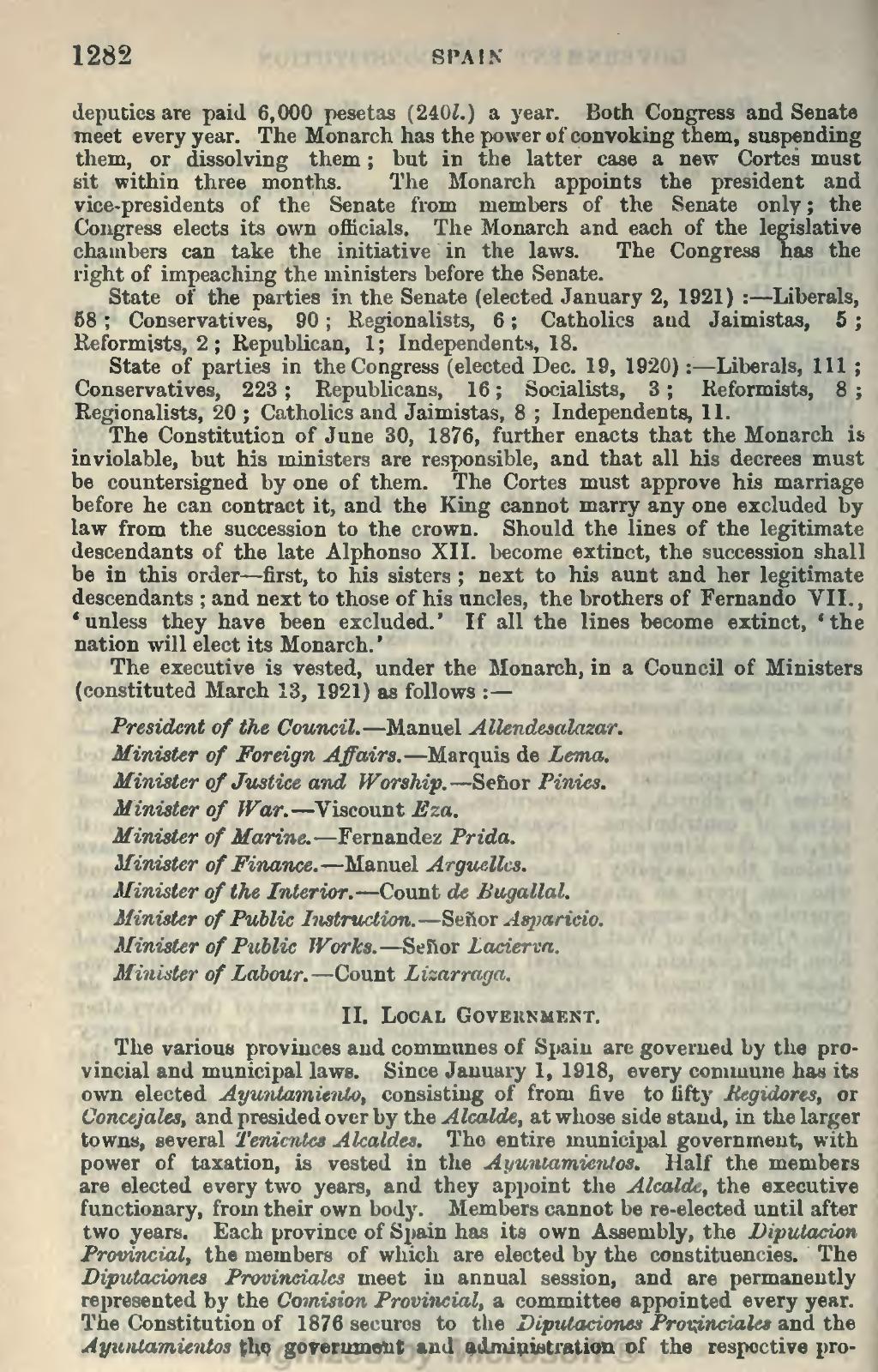1282 Spain
deputies are paid 6,000 pesetas (240Z.) a year. Both Congress and Senate meet every year. The Monarch has the power of convoking them, suspending them, or dissolving them ; but in the latter case a new Cortes must sit within three months. The Monarch appoints the president and vice-presidents of the Senate from members of the Senate only ; the Congress elects its own officials. The Monarch and each of the legislative chambers can take the initiative in the laws. The Congress has the right of impeaching the ministers before the Senate.
State of the parties in the Senate (elected January 2, 1921) : — Liberals, 58 ; Conservatives, 90 ; Regionalists, 6 ; Catholics and Jaimistas, 5 ; Reformists, 2; Republican, 1; Independents, 18.
State of parties in the Congress (elected Dec. 19, 1920) : — Liberals, 111 ; Conservatives, 223 ; Republicans, 16 ; Socialists, 3 ; Reformists, 8 ; Regionalists, 20 ; Catholics and Jaimistas, 8 ; Independents, 11.
The Constitution of June 30, 1876, further enacts that the Monarch is inviolable, but his ministers are responsible, and that all his decrees must be countersigned by one of them. The Cortes must approve his marriage before he can contract it, and the King cannot marry any one excluded by law from the succession to the crown. Should the lines of the legitimate descendants of the late Alphonso XII. become extinct, the succession shall be in this order — first, to his sisters ; next to his aunt and her legitimate descendants ; and next to those of his uncles, the brothers of Fernando VII., 'unless they have been excluded.' If all the lines become extinct, 'the nation will elect its Monarch. '
The executive is vested, under the Monarch, in a Council of Ministers (constituted March 13, 1921) as follows : —
President of the Council. — Manuel Allendcsalazo r . Minister of Foreign Affairs. — Marquis de Lema. Minister of Justice and Worship. — Senor 1'inics. Minister of War. — Viscount Eza. Minister of Marine. — Fernandez Prida. Minister of Finance. — Manuel Arguclles. Minister of the Interior. — Count de Bugallal. Minister of Public Instruction. — Senor Asparicio. Minister of Public Works. — Senor Lacicrva. Minister of Labour. — Count Lizarraga.
II. Local Govkknmkn IT.
The various provinces and communes of Spain are governed by the pro- vincial and municipal laws. Since January 1, 1918, every commune has its own elected Ayunlamiento, consisting of from live to fifty Jtcgidores, or Ooncejalcs, and presided over by the Alcalde, at whose side stand, in the larger towns, several Tenicntea Alcaldes. The entire municipal government, with power of taxation, is vested in the Ayuutamientos. Half the members are elected every two years, and they ap]>oint the Alcalde, the executive functionary, from their own body. Members cannot be re-elected until after two years. Each province of Spain has its own Assembly, the Diputacion Provincial, the members of which are elected by the constituencies. The Diputaciones Provinciates meet iu annual session, and are permanently represented by tho Comision Provincial, a committee appointed every year. The Constitution of 1876 secures to tho Diputaciones Proviuciales and the Ayuntamientos the government and administration of the respective pro-
